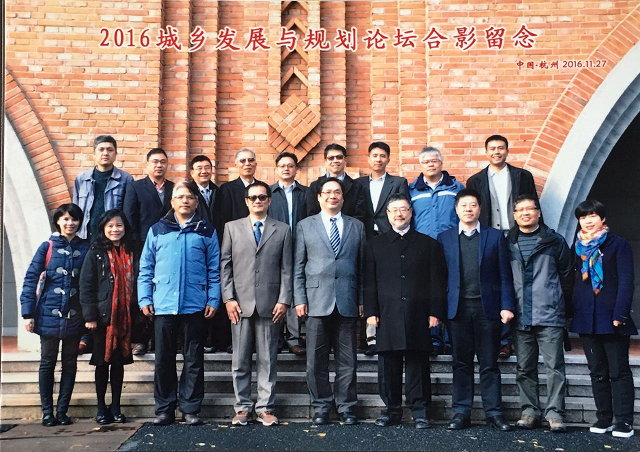"2016 Forum of Urban and Rural Development and Planning" was successfully held at College of Civil Engineering and Architecture, Zijingang Campus, Zhejiang University on November 27th, 2016 . Organized by the Institute of Urban and Rural Planning Theory and Technology of Zhejiang University, the forum invited the Department of Urban Planning and Development Management, School of Environmental Design of Chinese Culture University, Department of Urban Planning and Disaster Prevention, School of Design of Ming Chuan University, Institute of Public Affair Management of Sun Yat-sen University, Chinese Association of Urban Management, Chinese Association of Public Affair and other institutes of higher education and academic assciations.
The opening ceremony of the forum and the signing ceremony of strategic cooperation was held at Room A322, Anzhong Building. Prof. Luo Yaozhi, Dean of College of Civil Engineering and Architecture of Zhejiang University, extended warm congratulations to the forum and introduced the basic information of the university and the college to the visiting guests. Prof. Luo pointed out that deepening the cooperation with experts and scholars from Taiwan's elite universities and associations is conducive to promoting the construction of planning disciplines and to widening the horizon of teachers and students. Therefore, the college has great expectations and strong support for this cooperation. Prof. Han Haoying, Director of the Institute of Urban and Rural Planning Theory and Technology, introduced the basic information of the Department to the guests. He expressed that the cooperation with Taiwan experts and scholars in planning disciplines is extremely positive from the academic perspective. It is believed that the joint efforts will contribute to cross-strait academic development and Zhejiang University’s goal of building itself into a world-class university. On behalf of the Institute of Urban and Rural Planning Theory and Technology, Director Han Haoying signed the strategic cooperation agreement with the Chinese Association of Urban Management, and Department of Urban Planning and Development Management of Chinese Culture University. The representatives from the two institutes also made speeches. Mr. Zhuang Muxiong, Chairman of Chinese Association of Urban Management said that he was looking forward to cooperating with Zhejiang University and sharing his experience in the discipline work. He also pointed out that "civil engineering is the guiding plan and urban planning is the soft power." Mr. Yang Songling, Director of the Department of Urban Planning and Development Management of Chinese Culture University introduced the basic information of the School of Environmental Design and the Department of Urban Planning and Development Management, and reviewed the historical origins of close ties with Zhejiang University. He stressed that the Mr. Zhang, Chairman from Chinese Culture University had always been giving close attention to the development of Zhejiang University. The forum started at 10:00 am. In the relaxed and warm atmosphere, the teachers explored the two themes of "urban and rural development and planning in Hangzhou" and "urban and rural development and planning in Taiwan" in the round-table discussion, and exchanged views on the similarities and differences among development plans of Hangzhou, the northern part and the southern part of Taiwan. In the roundtable forum, ten teachers gave academic reports on different subjects. In this way, teachers and students gained a deep understanding of research points of urban and rural planning and development under different disciplines and research topics. The forum ended at 6 pm with fruitful results. In this forum, the participating units exchanged views and reached consensus on how to consolidate the forum foundation and to deepen the disciplinary cooperation. They unanimously decided to establish a normalization mechanism to further improve the quality of academic exchanges on planning disciplines and to contribute wisdom and strength to the cross-strait academic development. 



